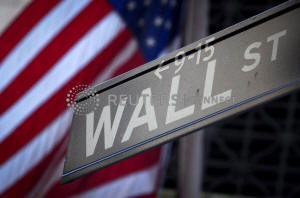|
U.S. bank executives say Wall Street has
reformed, though crisis scars linger
 Send a link to a friend
Send a link to a friend
 [April 09, 2019]
(Reuters) - The U.S. economy is
strong and Wall Street has reformed practices that contributed to the
financial crisis a decade ago, chief executives of some of the largest
U.S. banks said in prepared testimony released by the House Financial
Services Committee late on Monday. [April 09, 2019]
(Reuters) - The U.S. economy is
strong and Wall Street has reformed practices that contributed to the
financial crisis a decade ago, chief executives of some of the largest
U.S. banks said in prepared testimony released by the House Financial
Services Committee late on Monday.
But in discussing all the progress that has been made, there was also an
acknowledgement that scars from the crisis linger, and that many
consumers still have a negative perception of the financial industry.
"Confidence in U.S. financial services and the American economy remains
uncertain," wrote Jamie Dimon, CEO of JPMorgan Chase & Co, the largest
U.S. bank.
Testimony from CEOs of Citigroup Inc, Goldman Sachs Group Inc, Morgan
Stanley, Bank of New York Mellon, State Street Corp and Northern Trust
also appeared.

Wednesday will mark the first time the largest U.S. banks have appeared
before Congress since the 2008 financial crisis, and will see the CEOs
face off against Democratic Representative Maxine Waters and
progressives including Alexandria Ocasio-Cortez, who have fiercely
criticized Wall Street. Waters leads the committee which vets financial
companies on behalf of the U.S. lower house.
As the 2020 election race heats up, U.S. Democrats driven by progressive
firebrands like Senators Bernie Sanders and Elizabeth Warren see
financial inclusion as a draw for voters.
In their testimonies, the chief executives emphasized a range of
regulatory measures including stress tests and so-called "living wills"
adopted since 2008 that have helped bolster capital levels and improve
the safety and soundness of the U.S. system, as well as other
improvements to risk management and culture.
[to top of second column]
|

A Wall Street sign is pictured outside the New York Stock Exchange
in New York, October 28, 2013. REUTERS/Carlo Allegri/File Photo

Some banks including Morgan Stanley also emphasized the contribution
they make to the U.S. economy through community lending,
underwriting and green finance, while also acknowledging the
industry needed to do better on liberal issues like diversity.
"We recognize that we have significant work to do to achieve our
diversity goals, and that it requires efforts at every level of the
firm to deliver results over the long term," Morgan Stanley CEO
James Gorman wrote in his testimony.
Citigroup said the biggest U.S. banks are in a better position to
handle an economic downturn at present than they were during the
last crisis, adding that the bank has doubled its regulatory capital
since the financial crisis despite shrinking its balance sheet by
$500 billion over the last decade.
"We recognize that rebuilding trust is harder than rebuilding your
balance sheet," said Citigroup Chief Executive Mike Corbat.
The executives also discussed cybersecurity, diversity initiatives,
executive compensation and controversial arbitration clauses in
consumer contracts, in response to questions asked by Waters, who
invited them to appear.
(Reporting by Lauren LaCapra and Imani Moise in New York, Michelle
Price in Washington and Kanishka Singh in Bengaluru; Editing by
Gopakumar Warrier)
[© 2019 Thomson Reuters. All rights
reserved.]
Copyright 2019 Reuters. All rights reserved. This material may not be published,
broadcast, rewritten or redistributed.
Thompson Reuters is solely responsible for this content. |